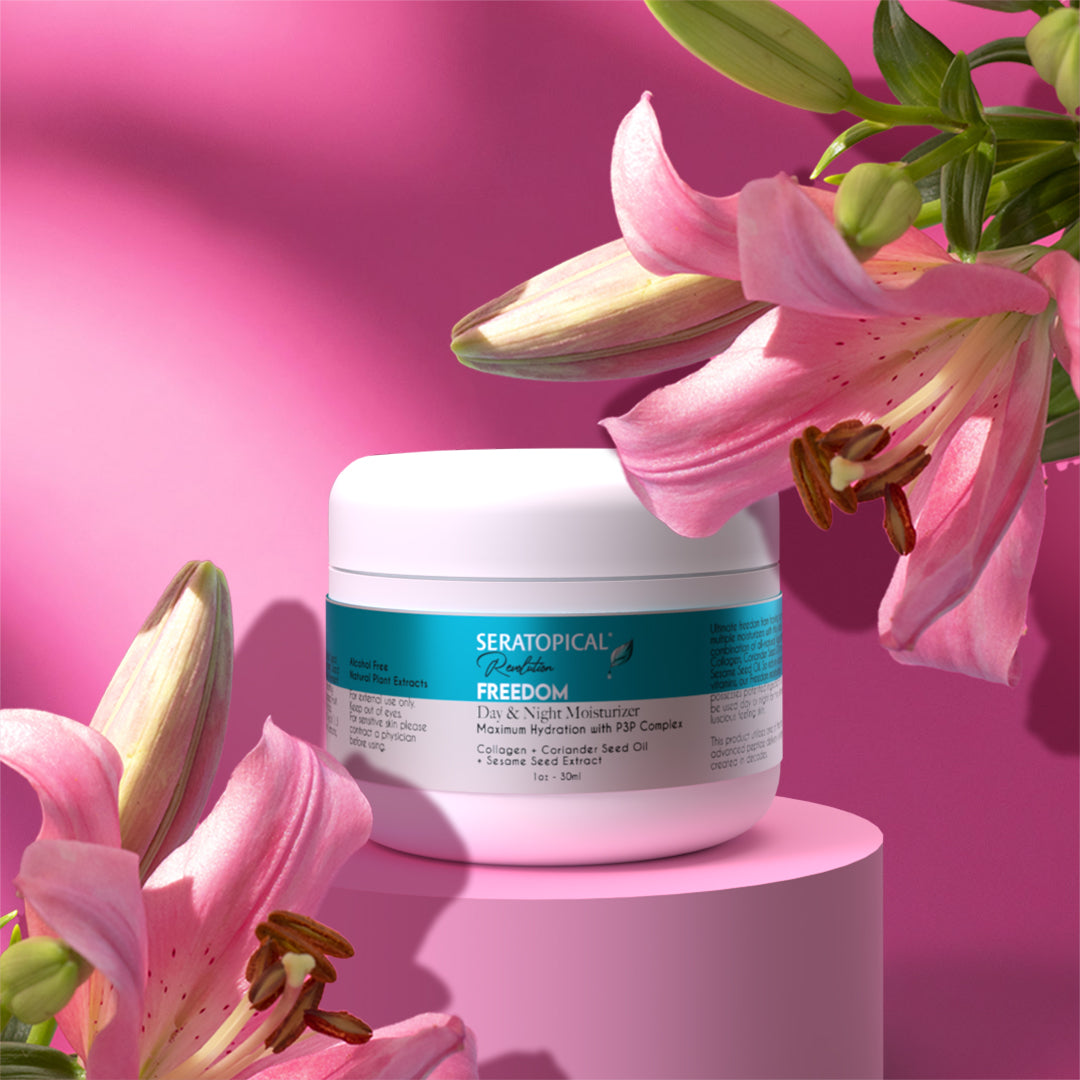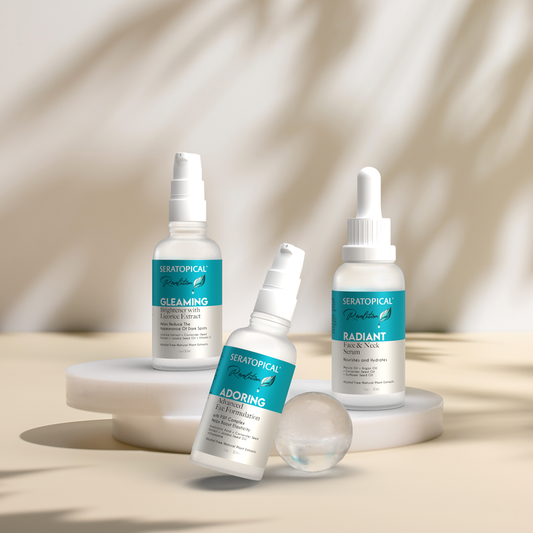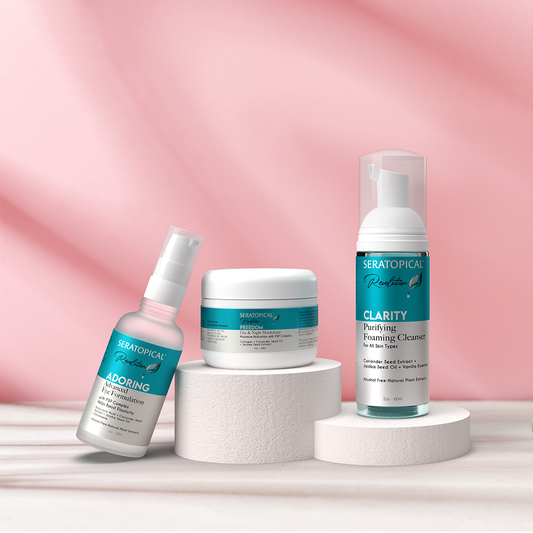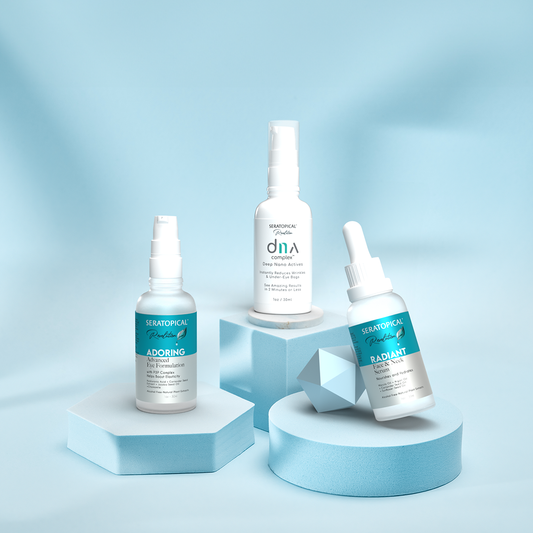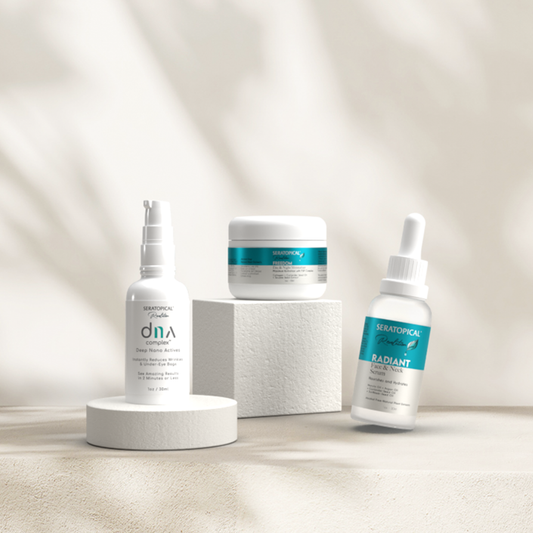Your skin is your largest organ. And it is teeming with trillions of microorganisms, like bacteria, fungi, and viruses. While this sounds scary these invisible life-forms are known as the skin microbiome. They are an important part of your overall health and the health of your skin. Everyone’s skin microbiome is a rainforest of diverse organisms which live in and on our skin’s various layers, from deep inside all the way up to your epidermal cells.
What Damages your Skin Microbiome?
In today’s modern world, skin microbiome has lost 80% of its microbial diversity. Products with harsh chemicals breakdown the naturally occurring healthy bacteria, referred to as microbiome.
When our microbiome becomes unbalanced, we can end up compromising the task force of beneficial bacteria that keeps our skin glowing and healthy, and causing dryness and irritation.
A study of the ancestral microbiome (i.e. what our skin looked like before we lived in the modern world) has revealed that our skin microbiome used to produce many of the essential biomolecules (nutrients such as vitamins A, D, K, and many others) needed for our skin to remain hydrated, supple, clear, and resilient. To combat modern-day environmental and lifestyle stressors, we use skincare to supplement our skin with the nutrients our microbiome can no longer make on its own. Simply put, microbiome skincare helps restore and maintain balance in the skin's health through innovative formulations that rely on science.
Microbiome skincare is the ultimate retreat to helping our natural state and is key to ridding our skincare routines of products that do more harm than good. As we continue to look to science, nature, and our own skin and body to heal itself, microbiome skincare will become more popular. In other words, look to plant based, natural ingredient products that can do amazing things for your skin without harsh chemicals.
Imbalanced Skin Microbiome Signs
In the world of skincare, the term "microbiome" is gaining increasing attention. Our skin is home to trillions of bacteria, fungi, and other microorganisms that form a delicate ecosystem known as the skin microbiome. When this balance is disrupted, it can lead to various skin issues.
Understanding the Skin Microbiome
The skin microbiome plays a crucial role in maintaining skin health. It helps protect against pathogens, regulates inflammation, and supports the skin's barrier function. However, factors such as environmental stressors, diet, skincare products, and antibiotics can disrupt this delicate balance, leading to an imbalanced skin microbiome.
Signs of Imbalanced Skin Microbiome
Increased Sensitivity: Imbalanced skin microbiome can manifest as heightened sensitivity, causing redness, itching, or stinging sensations.
Persistent Dryness or Oiliness: Fluctuations in skin hydration levels may indicate an imbalance in the skin microbiome, leading to persistent dryness or excessive oiliness.
Breakouts and Acne: Disruption of the skin microbiome can create an environment conducive to acne-causing bacteria, resulting in frequent breakouts.
Inflammation and Irritation: Imbalanced skin microbiome may trigger inflammatory skin conditions such as eczema, rosacea, or psoriasis.
Dull, Lackluster Skin: A compromised skin microbiome can impair the skin's ability to maintain a healthy glow, leading to dull, lackluster complexion.
Restoring Balance to the Skin Microbiome
Gentle Cleansing: Opt for mild, pH-balanced cleansers that help cleanse the skin without stripping away its natural oils.
Probiotic Skincare: Incorporate probiotic-rich skincare products into your routine to replenish beneficial bacteria and support skin health.
Prebiotics: Look for skincare products containing prebiotic ingredients that nourish and promote the growth of beneficial microorganisms.
Avoid Harsh Ingredients: Steer clear of harsh chemicals, fragrances, and preservatives that can disrupt the skin microbiome and cause further imbalance.
Balanced Diet: Maintain a healthy, balanced diet rich in fruits, vegetables, and probiotic-rich foods to support overall skin health from the inside out.
Regular Exfoliation: Incorporate gentle exfoliation into your skincare routine to remove dead skin cells and promote cell turnover, allowing beneficial bacteria to thrive.
Hydration: Keep the skin hydrated with moisturizers containing hydrating ingredients such as hyaluronic acid to support the skin barrier and prevent moisture loss.
Achieving and maintaining a healthy skin microbiome is essential for vibrant, radiant skin. By understanding the signs of imbalanced skin microbiome and adopting a holistic approach to skincare, you can restore harmony to your skin and unleash its natural beauty. Remember to listen to your skin's needs, choose products wisely, and embrace a skincare routine that nurtures and protects the delicate ecosystem of your skin microbiome.
Science-based Seratopical Revolution, formulated with natural plant-based anti-aging ingredients, no harsh chemicals, make it the perfect routine for taking care of your skin's microbiome.
Seratopical Revolution is fast absorbing with unique ingredients that include a breakthrough patent pending, triple peptide blend, P3P delivery system, that include vitamins, collagen, and hyaluronic acid, go deeper into the dermal layers providing maximum conditioning the for the skin, and improving the appearance of unwanted dark spots, while smoothing fine lines and wrinkles.
Lifestyle Tips to Restore Your Skin's Microbiome
The skin microbiome, a complex ecosystem of bacteria, fungi, and other microorganisms, plays a crucial role in maintaining skin health. When this delicate balance is disrupted, it can lead to various skin issues, including dryness, sensitivity, and inflammation. Fortunately, there are lifestyle changes you can make to support and restore your skin's microbiome.
Here are some practical tips to help you nurture and protect your skin from the inside out.
Eat a Balanced Diet: A nutritious diet is essential for overall health, including the health of your skin microbiome. Incorporate a variety of fruits, vegetables, whole grains, and lean proteins into your meals to provide your body with essential vitamins, minerals, and antioxidants. Foods rich in prebiotics, such as garlic, onions, and bananas, can also help nourish beneficial bacteria in your gut and skin.
Stay Hydrated: Proper hydration is crucial for maintaining healthy skin. Drink plenty of water throughout the day to keep your skin hydrated from the inside out. Hydrated skin is better able to support the growth of beneficial microorganisms and maintain its natural barrier function.
Practice Stress Management: Chronic stress can have a negative impact on your skin microbiome and overall skin health. Incorporate stress-reducing activities into your daily routine, such as meditation, yoga, deep breathing exercises, or spending time in nature. Finding healthy ways to manage stress can help support a healthy microbiome and promote radiant skin.
Get Quality Sleep: Quality sleep is essential for skin regeneration and repair. Aim for 7-9 hours of uninterrupted sleep each night to allow your body to rest and rejuvenate. Lack of sleep can disrupt your skin's microbiome and lead to increased inflammation and skin issues. Create a relaxing bedtime routine and prioritize sleep for optimal skin health.
Choose Gentle Skincare Products: The products you use on your skin can either support or disrupt its microbiome. Opt for gentle, fragrance-free skincare products that are free of harsh chemicals and preservatives. Look for products labeled as "microbiome-friendly" or containing probiotics and prebiotics to support a healthy balance of microorganisms on your skin.
Limit Antibiotic Use: Antibiotics can disrupt the natural balance of bacteria on your skin and throughout your body. Whenever possible, avoid unnecessary antibiotic use and talk to your healthcare provider about alternative treatment options. If you must take antibiotics, consider supplementing with probiotics to help replenish beneficial bacteria in your gut and skin.
Nurturing and restoring your skin's microbiome is essential for maintaining healthy, radiant skin. By incorporating these lifestyle tips into your daily routine, you can support your skin's natural balance of microorganisms and promote overall skin health from the inside out. Remember to listen to your skin's needs, prioritize self-care, and embrace a holistic approach to skincare for optimal results.
Spend Time in Nature
In our modern world filled with pollutants, stressors, and artificial environments, it's easy to forget the profound connection between nature and our skin health. However, spending time in nature can have a transformative impact on our skin microbiome, the diverse community of microorganisms that inhabit our skin. In this blog, we'll explore the symbiotic relationship between the skin microbiome and spending time in nature, and how reconnecting with the great outdoors can promote healthy, radiant skin.
The Healing Power of Nature
Nature has long been revered for its healing properties, and for good reason. Spending time in natural environments exposes us to a diverse array of microorganisms that can positively influence our skin microbiome. Studies have shown that individuals who spend more time outdoors tend to have more diverse and resilient skin microbiomes, which is associated with healthier, more radiant skin.
Benefits of Spending Time in Nature for Skin Health
- Increased Microbial Diversity: Exposure to diverse environments in nature introduces our skin to a wide range of beneficial microorganisms, promoting microbial diversity and resilience.
- Reduced Inflammation: Nature has a calming effect on the body and mind, reducing stress and inflammation that can negatively impact the skin microbiome.
- Enhanced Skin Barrier Function: The natural elements found in outdoor environments, such as sunlight and fresh air, can help strengthen the skin's barrier function, protecting against environmental stressors and pollutants.
- Improved Skin Hydration: Spending time in nature allows our skin to absorb moisture from the air, helping to hydrate and nourish the skin from within.
- Stress Reduction: Nature has been shown to reduce levels of cortisol, the stress hormone, which can have a positive impact on skin health and overall well-being.
Incorporating Nature Into Your Skincare Routine
- Spend Time Outdoors: Make time to enjoy outdoor activities such as hiking, gardening, or simply taking a leisurely stroll in the park.
- Practice Forest Bathing: Embrace the Japanese practice of shinrin-yoku, or forest bathing, by immersing yourself in the sights, sounds, and scents of the forest.
- Use Natural Skincare Products: Incorporate skincare products made with natural ingredients that support the skin microbiome and promote overall skin health.
- Protect Your Skin: While enjoying time outdoors, don't forget to protect your skin from harmful UV rays with sunscreen and wear protective clothing when necessary.
Sweat It Out
Exercise is not only beneficial for your physical health but also plays a significant role in the health of your skin. One fascinating aspect of this relationship is how exercise influences the skin microbiome, the diverse community of microorganisms that inhabit our skin. In this blog, we'll explore the connection between exercise and the skin microbiome, and how breaking a sweat can lead to healthier, more radiant skin.
Various factors such as diet, hygiene practices, and environmental exposures can influence the composition and diversity of the skin microbiome.
The Impact of Exercise on the Skin Microbiome
- Increased Microbial Diversity: Studies have shown that regular exercise can lead to a more diverse and resilient skin microbiome. Exercise-induced changes in body temperature, pH levels, and sweat production create an environment that promotes the growth of beneficial microorganisms on the skin.
- Enhanced Skin Barrier Function: Exercise stimulates blood flow to the skin, which can improve the delivery of nutrients and oxygen to skin cells. This, in turn, supports the skin's barrier function, helping to protect against environmental stressors and pollutants.
- Regulation of Inflammation: Exercise has anti-inflammatory effects on the body, which can help reduce inflammation in the skin. By moderating immune responses and cytokine production, exercise promotes a balanced inflammatory response in the skin, which is essential for skin health.
- Detoxification: Sweating during exercise is the body's natural way of detoxifying and removing toxins from the skin. Sweat contains antimicrobial peptides that help eliminate harmful bacteria from the skin's surface, promoting a cleaner, clearer complexion.
- Stress Reduction: Exercise is known to reduce stress levels and promote relaxation, which can have a positive impact on skin health. Chronic stress can disrupt the skin microbiome and lead to various skin issues, such as acne, eczema, and psoriasis.
Incorporating Exercise Into Your Skincare Routine
- Find Activities You Enjoy: Whether it's jogging, yoga, dancing, or hiking, find physical activities that you enjoy and incorporate them into your regular routine.
- Stay Hydrated: Drink plenty of water before, during, and after exercise to stay hydrated and support healthy skin function.
- Practice Good Hygiene: After exercising, cleanse your skin with a gentle, pH-balanced cleanser to remove sweat and debris without stripping away its natural oils.
- Protect Your Skin: Don't forget to apply sunscreen before heading outdoors to protect your skin from harmful UV rays, even on cloudy days.
Exercise is not only good for your body and mind but also for your skin. By breaking a sweat and engaging in regular physical activity, you can support and nourish your skin microbiome, leading to healthier, more radiant skin. So, lace up your sneakers, hit the gym, and sweat it out for glowing skin from the inside out. Your body and your skin will thank you for it.
Take Care of Your Gut
The concept of the gut-skin connection highlights the intricate relationship between our digestive system and the health of our skin. At the heart of this connection lies the gut microbiome, a vast community of microorganisms that inhabit our digestive tract and play a vital role in overall health. In this blog, we'll explore how taking care of your gut can positively influence your skin microbiome, leading to healthier, more radiant skin.
This complex ecosystem of the gut microbiome plays a crucial role in various bodily functions, including digestion, immune function, and nutrient absorption. A healthy gut microbiome is characterized by a diverse array of beneficial microorganisms that work together to maintain balance and harmony within the digestive system.
The Gut-Skin Connection
Research has increasingly shown that the health of our gut microbiome directly impacts the health of our skin. The gut and skin are connected through various pathways, including the immune system, nervous system, and hormonal balance. Disruptions in the gut microbiome can lead to systemic inflammation, immune dysfunction, and imbalances in hormone levels, all of which can manifest as skin issues such as acne, eczema, and psoriasis.
Taking Care of Your Gut for Healthy Skin
- Eat a Balanced Diet: Consuming a diet rich in fruits, vegetables, whole grains, and lean proteins provides essential nutrients that support gut health and promote a diverse microbiome. Incorporate fermented foods such as yogurt, kimchi, and sauerkraut, which contain probiotics that can help replenish beneficial bacteria in the gut.
- Avoid Inflammatory Foods: Limiting the intake of processed foods, refined sugars, and artificial additives can help reduce inflammation in the gut and support a healthy microbiome. These foods can disrupt the balance of microorganisms in the gut and contribute to skin issues.
- Stay Hydrated: Drinking an adequate amount of water is essential for maintaining hydration and promoting healthy digestion. Proper hydration supports the movement of food through the digestive tract and helps flush toxins from the body, which can positively impact gut and skin health.
- Manage Stress: Chronic stress can disrupt the balance of microorganisms in the gut and contribute to skin issues such as acne and eczema. Incorporate stress-reducing activities into your daily routine, such as meditation, yoga, or deep breathing exercises, to support both gut and skin health.
- Consider Probiotic Supplements: In addition to probiotic-rich foods, consider taking probiotic supplements to support gut health and promote a diverse microbiome. Look for supplements that contain a variety of beneficial strains and are formulated for digestive and immune support.
Nurturing your gut microbiome is essential for maintaining healthy, radiant skin. By adopting a gut-friendly lifestyle that includes a balanced diet, hydration, stress management, and probiotic supplementation, you can support the health of your gut microbiome and positively influence your skin microbiome. Remember that the gut-skin connection is a two-way street, and taking care of your gut can lead to happier, healthier skin from the inside out.
Be Mindful of How You Shower
Showering is a daily ritual for many of us, but have you ever considered how your shower routine might be affecting the health of your skin microbiome? The skin microbiome, a diverse community of microorganisms that inhabit our skin, plays a crucial role in maintaining skin health. In this blog, we'll explore the connection between your shower habits and the health of your skin microbiome, and how making mindful choices can lead to healthier, more radiant skin.
Disruptions to the skin microbiome, such as excessive cleansing or the use of harsh skincare products, can lead to imbalances that contribute to various skin issues.
Shower Habits That Impact Your Skin Microbiome
- Water Temperature: Hot water can strip the skin of its natural oils and disrupt the balance of microorganisms on the skin. Opt for lukewarm water instead, which is gentler on the skin and less likely to cause dryness or irritation.
- Cleansing Products: Choose gentle, pH-balanced cleansers that effectively cleanse the skin without stripping away its natural oils. Avoid products containing harsh chemicals or fragrances, as these can disrupt the skin microbiome and lead to inflammation.
- Frequency of Showering: While it's important to maintain good hygiene, showering too frequently can actually be detrimental to the health of your skin microbiome. Aim to shower no more than once or twice a day, and consider skipping the soap on areas of the body that don't typically get sweaty or dirty, such as your legs or arms.
- Drying Techniques: Pat your skin dry with a soft towel after showering rather than rubbing vigorously, which can irritate the skin and disrupt the microbiome. Allow your skin to air dry whenever possible to minimize friction and promote healthy skin barrier function.
- Moisturizing: Apply a hydrating moisturizer or body oil to damp skin after showering to help lock in moisture and support the skin barrier. Look for products containing hydrating ingredients such as hyaluronic acid or ceramides to nourish and protect the skin microbiome.
Mindful Showering for Healthy Skin
- Practice Moderation: Avoid over-cleansing or over-exfoliating the skin, as this can disrupt the balance of microorganisms and lead to dryness or irritation. Listen to your skin's needs and adjust your shower routine accordingly.
- Choose Natural Products: Opt for skincare products made with natural ingredients that support the health of your skin microbiome. Look for products labeled as "microbiome-friendly" or containing probiotics and prebiotics to promote a healthy balance of microorganisms on the skin.
- Be Gentle: Treat your skin with care and gentleness during your shower routine. Avoid scrubbing too vigorously or using harsh exfoliants that can damage the skin barrier and disrupt the microbiome.
- Stay Hydrated: Drink plenty of water to stay hydrated from the inside out, which can help support healthy skin function and maintain the balance of microorganisms on the skin.
- Listen to Your Body: Pay attention to how your skin responds to different shower habits and adjust your routine accordingly. If you notice any signs of irritation or imbalance, consider making changes to your shower routine to better support the health of your skin microbiome.
Your shower routine can have a significant impact on the health of your skin microbiome. By being mindful of the products you use, the water temperature, and your cleansing habits, you can support a healthy balance of microorganisms on your skin and promote radiant, glowing skin. Remember to listen to your body, practice moderation, and prioritize gentle, nourishing skincare products to keep your skin microbiome happy and healthy.
Minimize Stress
Stress is an unavoidable part of life, but did you know that it can have a significant impact on the health of your skin? The skin microbiome, a diverse community of microorganisms that inhabit the surface of your skin, plays a crucial role in maintaining skin health. In this blog, we'll explore the connection between stress and the skin microbiome, and how minimizing stress can lead to healthier, more radiant skin.
A healthy skin microbiome is essential for maintaining clear, radiant skin and preventing issues such as acne, eczema, and psoriasis.
The Impact of Stress on the Skin Microbiome
- Increased Inflammation: Chronic stress can lead to increased levels of inflammation in the body, which can negatively impact the skin microbiome. Inflammation disrupts the balance of microorganisms on the skin and can contribute to various skin issues, including redness, irritation, and breakouts.
- Imbalanced Immune Function: Stress can weaken the immune system, making the skin more susceptible to infections and inflammatory conditions. A compromised immune system may also affect the skin's ability to regulate its microbiome, leading to dysbiosis and skin issues.
- Changes in Skin Barrier Function: Stress hormones such as cortisol can affect the skin's barrier function, leading to increased water loss and decreased protection against environmental stressors. This can disrupt the balance of microorganisms on the skin and contribute to dryness, sensitivity, and other skin issues.
- Altered Sebum Production: Stress can influence sebum production in the skin, leading to changes in oiliness and acne severity. Excess sebum production provides an ideal environment for acne-causing bacteria to thrive, further disrupting the skin microbiome.
Minimizing Stress for Healthy Skin
- Practice Stress-Relief Techniques: Incorporate stress-relief techniques such as meditation, deep breathing exercises, yoga, or mindfulness into your daily routine to help reduce stress levels and promote relaxation.
- Prioritize Self-Care: Make time for self-care activities that help you relax and unwind, such as taking a bath, going for a walk in nature, or spending time with loved ones.
- Get Adequate Sleep: Prioritize getting enough sleep each night to allow your body to rest and rejuvenate. Lack of sleep can exacerbate stress and negatively impact skin health.
- Exercise Regularly: Engage in regular physical activity to help reduce stress levels and promote overall well-being. Exercise releases endorphins, which can improve mood and reduce stress.
- Maintain a Healthy Lifestyle: Eat a balanced diet, stay hydrated, and avoid excessive alcohol and caffeine consumption, which can exacerbate stress and negatively impact skin health.
Minimizing stress is essential for maintaining a healthy skin microbiome and promoting radiant, glowing skin. By incorporating stress-relief techniques into your daily routine and prioritizing self-care, you can help support a balanced microbiome and keep your skin looking its best. Remember to listen to your body, practice self-compassion, and take steps to minimize stress for optimal skin health and overall well-being.
Science Based Seratopical Revolution, formulated with natural plant-based anti-aging ingredients, no harsh chemicals, make it the perfect routine for taking care of your skin's microbiome.
Seratopical Revolution’s, is fast absorbing with unique ingredients that include a breakthrough patent pending, triple peptide blend, P3P delivery system, that include vitamins, collagen, and hyaluronic acid, go deeper into the dermal layers providing maximum conditioning the for the skin, and improving the appearance of unwanted dark spots, while smoothing fine lines and wrinkles.


